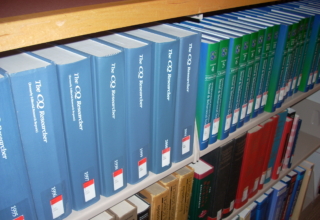
Endnotes
1 Stratford Sherman and Alyssa Freas. “The wild west of executive coaching,” Harvard Business Review, 2004, 82 (11), pp. 82-90.
2 Corporate Leadership Council. “Maximizing returns on professional executive coaching,” Strategic Research – Key Findings from Past Council Research: Succession Management and Leadership Development, May, 2003.
3 Anthony M. Grant and Michael J. Cavanagh. “Toward a profession of coaching: Sixty-five years of progress and challenges for the future,” International Journal of Evidence Based Coaching and Mentoring, 2004, 2 (1) pp. 1-16.
4 Thomas Leonard. Newsweek, February 5, 1996, p. 48.
5 Douglas T. Hall, Karen L. Otazo, and George P. Hollenbeck. “Behind closed doors: What really happens in executive coaching,” Organizational Dynamic, 1999, pp. 39-53.
6 Wall Street Journal, CCXL (90) November 5, 2002.
7 David Clutterbuck and David Megginson. “Your organization: Where is it on the road to becoming a coaching culture?” Training Journal, June 2005, pp. 18-22.
8 Paul Michelman. “What an executive coach can do for you,” Harvard Business School Working Knowledge, June 13, 2005.
9 Douglas T. Hall, Karen L. Otazo, and George P. Hollenbeck. “Behind closed doors: What really happens in executive coaching,” Organizational Dynamics, Winter 1999, 27(3), pp. 39-53.
10 Linda Bjornberg. “Training and development: Best practices,” Public Personnel Management, Winter 2002, 31(4), pp. 507-517.
11 Kerry A. Bunker, Kathy E. Kram, and Sharon Ting. “The young and the clueless,” Harvard Business Review, December 2002, 80(12), pp. 80-87.
12.Ryan K. Lahti and Michael M. Beyerlein. “Knowledge transfer and management consulting: A look at ‘the firm’,” Business Horizons, January / February 2000, 43(1).
13 Kenneth Cloke and Joan Goldsmith. “Conflict resolution that reaps great rewards,” Journal for Quality & Participation, May/ June 2000, 23(3), pp.27-31 .
14 Judy O’Neil and Sharon Lamm. “Working as a learning coach team in action learning,” New Directions for Adult and Continuing Education, Fall 2000, 87, pp. 43-52.
15 Douglas T. Hall, Karen L. Otazo, and George P. Hollenbeck. “Behind closed doors: What really happens in executive coaching,” Organizational Dynamics, Winter 1999, 27(3), pp. 39-53.
16 Mary Wayne Bush. Client Perceptions of Effectiveness in Executive Coaching. Dissertation, Los Angeles, CA: Pepperdine University, 2004.
17 Paul Michelman. “Are there organizational risks to coaching?” Harvard Business School Working Knowledge, June 13, 2005.
18 Paul Michelman. “What an executive coach can do for you,” Harvard Business School Working Knowledge, June 13, 2005.
19 Marshall Goldsmith. “Changing leadership behavior,” The Journal for Quality and Participation, 2004, Winter, pp. 28-33.
20 Sheila Maher and Suzi Pomerantz. “The future of executive coaching: Analysis from a market life cycle approach,” International journal of Coaching in Organization, 2003, 1(2), pp. 3-11.














